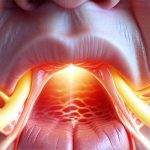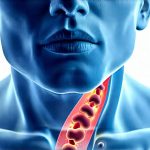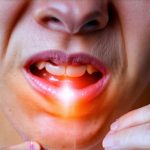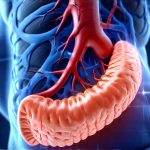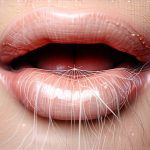Gastroesophageal reflux disease (GERD) impacts millions globally, often manifesting as heartburn, regurgitation, and difficulty swallowing. But beyond these classic symptoms, many individuals experience unexpected discomfort – specifically, a painful sensation after consuming cold liquids like water or ice. This seemingly innocuous act can trigger sharp, burning pain in the chest, throat, or even the abdomen for those with GERD, leaving them puzzled and seeking understanding. It’s crucial to recognize that this isn’t necessarily an indication of a separate condition; rather, it’s frequently a nuanced aspect of how GERD interacts with the sensitive esophageal tissues and digestive processes.
The discomfort arises from a confluence of factors related to both GERD itself and the physiological response to cold temperatures. The esophagus, already potentially inflamed or irritated by frequent acid exposure in GERD sufferers, is highly susceptible to temperature changes. Cold liquids can cause esophageal spasms, momentary contractions of the esophageal muscles, which feel like intense pain. Furthermore, the sudden temperature shift can temporarily disrupt the lower esophageal sphincter (LES), the muscle that prevents stomach acid from flowing back up into the esophagus, potentially exacerbating reflux symptoms even if they weren’t present before drinking the cold liquid. Understanding this interplay is key to managing and minimizing these painful episodes. You may also find helpful information about how can drinking less water impacts digestion.
The Esophageal Sensitivity Connection
The core of why cold water or ice causes pain in GERD patients lies in heightened esophageal sensitivity. Individuals with GERD often develop an increased awareness, even hyper-awareness, of normal bodily sensations within the esophagus. This isn’t just about feeling acid reflux; it’s a broader hypersensitivity to pressure, temperature changes, and even normal muscle contractions. Years of chronic inflammation from acid exposure can essentially “rewire” the nerves in the esophagus, making them more reactive. Think of it like a car alarm that is easily triggered – even minor disturbances are perceived as significant threats.
This heightened sensitivity means that what might feel like a mild cooling sensation to someone without GERD can register as intense pain for someone with the condition. The cold liquid isn’t necessarily causing damage; it’s simply triggering nerves that are already primed to overreact. This explains why some people with GERD avoid not just hot or spicy foods, but also very cold drinks, recognizing them as potential triggers. It is important to note this sensitivity can vary greatly between individuals – what causes pain for one person may be tolerable for another. If you suspect food sensitivities are contributing to your discomfort, exploring enzyme deficiencies and food pain could offer some insights.
This phenomenon isn’t limited to cold liquids; it can extend to other stimuli. Some GERD sufferers report discomfort after consuming carbonated beverages, very hot drinks, or even large volumes of water, all contributing to the complex experience of living with this condition. Managing esophageal sensitivity often involves a multi-faceted approach that includes dietary modifications, medication (as prescribed by a doctor), and stress management techniques.
The Role of Esophageal Spasms & LES Dysfunction
Beyond heightened sensitivity, esophageal spasms are frequently implicated in cold water/ice-induced pain. These involuntary contractions of the esophageal muscles can be incredibly painful, mimicking heart attack symptoms in some cases. While the exact cause of esophageal spasms is still being researched, they’re more common in people with GERD and other esophageal disorders. Cold liquids can act as a trigger for these spasms due to their rapid temperature change, causing the muscles to contract abruptly.
Furthermore, the lower esophageal sphincter (LES) plays a crucial role. The LES normally maintains pressure to keep stomach acid where it belongs – in the stomach. However, GERD often involves a weakened or relaxed LES, allowing acid reflux to occur. Introducing a cold liquid can temporarily further disrupt LES function. The sudden temperature change might cause the muscle to relax momentarily, creating an opportunity for even more acid to flow upwards and irritate the esophagus. This combination of spasms and potential increased reflux creates a vicious cycle of discomfort. It’s also worth considering that some individuals may not experience noticeable heartburn alongside this pain; they simply feel the sharp, burning sensation without the typical acid reflux symptoms. Understanding gut pain and additives can also help you identify potential triggers in your diet.
Identifying Triggers & Dietary Adjustments
Pinpointing your personal triggers is paramount to managing GERD-related pain after drinking cold liquids. Keeping a detailed food and symptom diary can be incredibly helpful. Record what you eat or drink, how much, and any associated symptoms – including the intensity of the pain, its location, and how long it lasts. This will help identify patterns and determine which specific temperatures or volumes trigger your discomfort.
Here are some dietary adjustments to consider:
1. Reduce consumption of very cold beverages. Experiment with room-temperature or slightly chilled water instead.
2. Avoid large volumes of liquid at once, as this can put pressure on the LES. Sip slowly throughout the day.
3. Identify other potential triggers: Beyond temperature, consider carbonation, caffeine, alcohol, and spicy foods, which can also exacerbate GERD symptoms. Recognizing emotional triggers is important for holistic management too.
Lifestyle Modifications for Symptom Management
Lifestyle changes are often the first line of defense against GERD-related pain. Elevating the head of your bed by 6-8 inches can help prevent acid reflux while you sleep. Avoid eating large meals, especially close to bedtime. Losing weight if you’re overweight or obese can also significantly reduce pressure on the abdomen and LES.
Furthermore, stress management is vital. Stress can worsen GERD symptoms, so finding healthy ways to cope with stress – such as exercise, yoga, meditation, or spending time in nature – is essential. Smoking cessation is another crucial step; smoking weakens the LES and increases stomach acid production. These lifestyle changes often work synergistically with dietary adjustments to provide significant relief. Sometimes, simple changes can help you rediscovering joy in food again.
When To Seek Medical Evaluation
While many individuals can manage their GERD symptoms through lifestyle and dietary modifications, it’s important to seek medical evaluation if your pain is severe, persistent, or accompanied by other concerning symptoms. Difficulty swallowing (dysphagia), unintentional weight loss, vomiting, or blood in your stool are all red flags that require prompt attention.
A healthcare professional can perform diagnostic tests – such as an endoscopy, pH monitoring, or esophageal manometry – to assess the severity of your GERD and rule out other potential causes of your pain. They can also recommend appropriate treatment options, which may include medications like proton pump inhibitors (PPIs) or H2 blockers to reduce stomach acid production, or referral to a gastroenterologist for further evaluation and management. Never self-diagnose or self-treat; always consult with a qualified healthcare provider for personalized medical advice. Remember to also consider tips for avoiding liver stress during times of illness.


